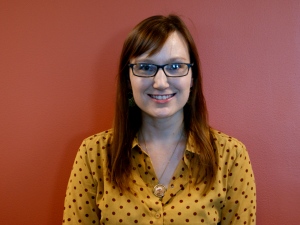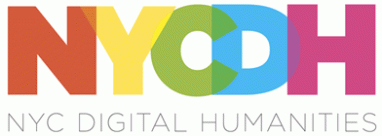The development and use of digital tools for research, publishing, and pedagogy are increasingly becoming an important part of academic life, not just for digital humanists but for anyone working in the humanities. The Fordham Graduate Student Digital Humanities Group was formed in 2012 to discuss and learn about practices and methodologies in the digital humanities, particularly in the contexts of graduate studies and professionalization.
This group is of special interest to students who are preparing for a professional academic career in the humanities, a career that most likely will require digital fluency in regards to their teaching, research, and publishing. The Fordham GSDH Group welcomes students from all disciplines. No experience using digital tools or methods is required. What we do want is your willingness to learn and participate. Share with others what you know and what you want to learn.
During the 2012-13 academic year, the Fordham GSDH Group organized over a dozen events, including several workshops, a reading group, one field trip, and hosted a guest lecturer. These events were open to the entire campus community and offered faculty, staff, and graduate students the opportunity to meet with people outside their disciplines and get better acquainted with members from their own departments. We will continue our activities this year.
What follows is a recap of some of last year’s many highlights. A complete description of all our activities can be read in more detail here, at the Fordham GSDH Group website.
Fall semester began with the training workshop, “Digital Pedagogy: What Is It? How Do You Do It?” Three graduate students each led a brief, hands-on demonstration. Patrick Burns, a PhD candidate in Classics, opened with “Eliminating the Handout: Paperless Teaching and the Less-Paper Reality.” Patrick acknowledged that a paperless class may not be for everyone, but he also pointed out that less paper, not more, is becoming the reality as more students embrace laptops and tablets. He offered suggestions for giving online quizzes and how to encourage students to take good electronic notes.
Elizabeth Cornell, at the time of the workshop a Pre-Doctoral Teaching Fellow in English, followed with “Five Easy Ways to Incorporate Digital Tools into the College Classroom.” She shared her teaching strategies for helping students develop expertise with digital tools, including WordPress, Zotero, Prezi, GoogleDrive. In her classes, she places emphasis on digital media and technology that students will most likely need to know in the real world and that can be useful in other classes, too.
In his talk, “From Public Course Blogs to Grand, Aggregated Experiments,” Will Fenton, PhD Candidate in English, offered an informative overview of the Digital Humanities and Pedagogy course that he took at CUNY’s Grad Center in the fall semester. The course covers many things, from gaining proficiency in USC’s Hypercities mapping program to participating in the ongoing debate about whether humanities people should learn to code. Will’s description of his class left many of us wishing we’d signed up for the course, too.
Many workshop participants were encountering these digital humanities methods and practices for the first time. Their reservations about trying out new things in their classrooms led Patrick to remark that it’s “important for all of us to maintain an open discussion of successes and failures as we adopt the tools and strategies of digital pedagogy.”
Open discussion of success and failure: That’s a leading tenet of the digital humanities and one of the main reasons why our group exists.
And so the Fordham GSDH Group continued its open discussion in November, with “You Online: Developing Your Online Academic Presence.” This workshop was led by Michael Mandiberg, author of The Social Media Reader and a teacher at the College of Staten Island and the CUNY Graduate Center. An audience of over 50 graduate students, faculty, and administrators discovered how important it is for people working in academia to cultivate their online presence. A strong online presence is particularly critical for graduate students and new tenure track teachers who need to make connections with people in their field and promote their work. Mandiberg gave step-by-step instructions for how to effectively use WordPress for professional promotion, or “branding.” Given that the workshop took place only a couple of days after Hurricane Sandy hit, everyone was very pleased with the turnout. Elizabeth Cornell coordinated the event, working closely with Nicol Gotsis, Director of Student Development at the GSAS.
Members of the Fordham GSDH began the spring semester by becoming citizen cartographers, as this report explained back in February 2013:
What do you do with a growing collection of international maps that contains over 433,000 sheet maps and 20,000 book atlases, some of which date back to the 15th century? Twelve graduate students and one post-doc from Fordham University recently learned that you digitize it, of course. At the New York Public Library’s Lionel Pincus and Princess Firyal Map Division, the effort to digitize thousands of maps has begun with some New York City and antiquarian maps. But more than just make high-resolution images of these maps, the library also developed “Map Warper,” a tool which allows anyone with a computer and an internet connection to digitally align (also known as “rectify”) these maps to match today’s precise maps, using online maps such as OpenStreetMap and GoogleEarth. This mapping project joins “What’s On the Menu,” another fabulous digital crowdsourcing project at the library.
On a grey February day, our small group from Fordham assembled at the Research Library on 42nd St. to learn how to use MapWarper and become what the library calls “Citizen Cartographers.” The patient and delightful Mishka Vance, a technical assistant at the library, used a digitized, early twentieth-century Bronx fire map to demonstrate how to digitally trace buildings, add information about them (brick, wood, or stone? residence or business?) to the database, and rectify the old map with a contemporary one.
Participants then proceeded to trace and rectify maps of their own choosing from the library’s digitized collection. Our group rectified several maps that day, including an early postal map from the Midwest, an ancient map of Cyprus, and a 1916 survey of Morningside Heights.
Workshop participants represented several departments, including English, Classics, Theology, and Medieval Studies. They came for reasons that ranged from using Map Warper in their research, to using it in their teaching, to simply adding to their knowledge base of digital tools.
As the trip to the NYPL demonstrates, one of the major aims of the Fordham GSDH Group is to help navigate what seems like a vast and overwhelming digital humanities tent, filled with tools and lots of people with ideas about how to use them. The easier path would be to find some pleasant campfire close by and toast marshmallows. But as 15 Fordham University faculty and graduate students learned during the Omeka workshop on April 3, the barrier to entry into the tent is quite low. Alex Gil, Columbia University’s Digital Scholarship Coordinator, did a terrific job leading the workshop.
Omeka, as Wikipedia defines it, is a free, open source, content management system for online collections. It was developed by the Roy Rosenzweig Center for History and New Media at George Mason University. The Andrew Mellon Foundation gave Omeka’s developers a technology collaboration award. Omeka is used by researchers, archivists, museum curators, students, and teachers to curate digitized content, using images, text, and metadata.
For this workshop, Alex showed us a few notable sites–or exhibits, as they’re called–that use Omeka, including “Lincoln at 200,” a collaborative project involving the Newberry Library, the Chicago History Museum, and the Abraham Lincoln Bicentennial Commission. Then he carefully walked us through the procedure for starting an Omeka exhibit. Workshop participants brought a diverse collection of material to work on, including French medieval manuscripts, pre-Columbian art, and a personal photograph album. The group felt so enthusiastic about the session, that we may ask Alex back for a second workshop on building exhibits in Omeka.
We look forward to more great events in the 2013-14 academic year. In fact, we’ve already got a few things planned: Patrick Burns will lead a discussion on Matthew Jockers’ book, Macroanalysis. Elizabeth Cornell will lead a GSAS-sponsored workshop on using Zotero for teaching and research. In the spring, THATCamp Digital Writing will be coming to Fordham. Come to our first meeting in September! Date TBA soon.







